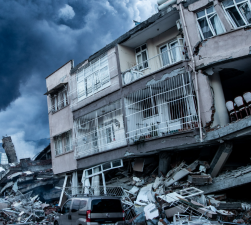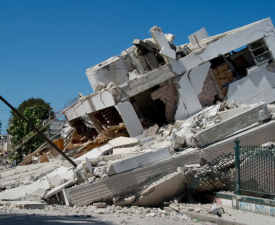According to statistics, there are more than 5 million earthquakes in the world every year, an average of more than 10,000 earthquakes per day. Most earthquakes are small and cannot be felt by humans. There are about 10 to 20 earthquakes that can cause serious harm to humans every year. So, how are earthquakes caused? Can they be predicted? Recently, the 7.8-magnitude earthquake in Turkey and Syria has attracted worldwide attention. Experts said that the earthquake occurred at the junction of four major fault zones, with a power of about 130 atomic bombs that exploded for 43 seconds. So, how are earthquakes caused? Can they be predicted?

Can the energy of earthquakes be calculated?
According to statistics, there are more than 5 million earthquakes in the world every year, an average of more than 10,000 earthquakes per day. Most earthquakes are small and cannot be felt by humans. There are about 20 earthquakes that can cause serious harm to humans every year.
Advances in earthquake research
The study shows that machine learning is driving significant progress in earthquake research. "Modern seismic networks generate huge data sets that, if analyzed properly, can provide valuable insights into the precursors of seismic events," Professor Girona pointed out.
"This is where advances in machine learning and high-performance computing can play a transformative role, allowing researchers to identify meaningful patterns that may indicate an impending earthquake."
However, the researchers cautioned against immediately deploying their algorithm to a new region without adequate training on the region's historical seismic activity.
Experts stressed the importance of testing the approach in near-real-time scenarios to identify and address potential forecasting challenges.

Impact on public safety
The ability to generate reliable earthquake forecasts has far-reaching implications for public safety, disaster preparedness, and economic stability.
"Accurate forecasts have the potential to save lives and reduce economic losses by providing early warnings for timely evacuation and preparation," Girona said. "However, the inherent uncertainty in earthquake forecasting also raises significant ethical and practical issues."
"False alarms can lead to unnecessary panic, economic disruption, and loss of public trust, while missed forecasts can have catastrophic consequences."
From long-term observations of human-induced earthquake precursors, I concluded that if transverse magnetic field waves exist, they should occur at different frequencies at different longitudes and latitudes corresponding to different seismic zones. For example, when I sense earthquake precursors that are relatively close to my area, such as Taiwan or Indonesia, the time to predict the earthquake will be shorter than that in more distant South America or North America. This can be used to calculate the propagation speed of Zhang Heng waves. If humans can create an instrument that can test Zhang Heng waves, the difficulty of predicting large earthquakes can be overcome. I hope that my hypothesis can be valued by all-round excellent scientists with marginal science, and a scientific paradigm formula can be deduced to promote the progress of earthquake prediction science.
